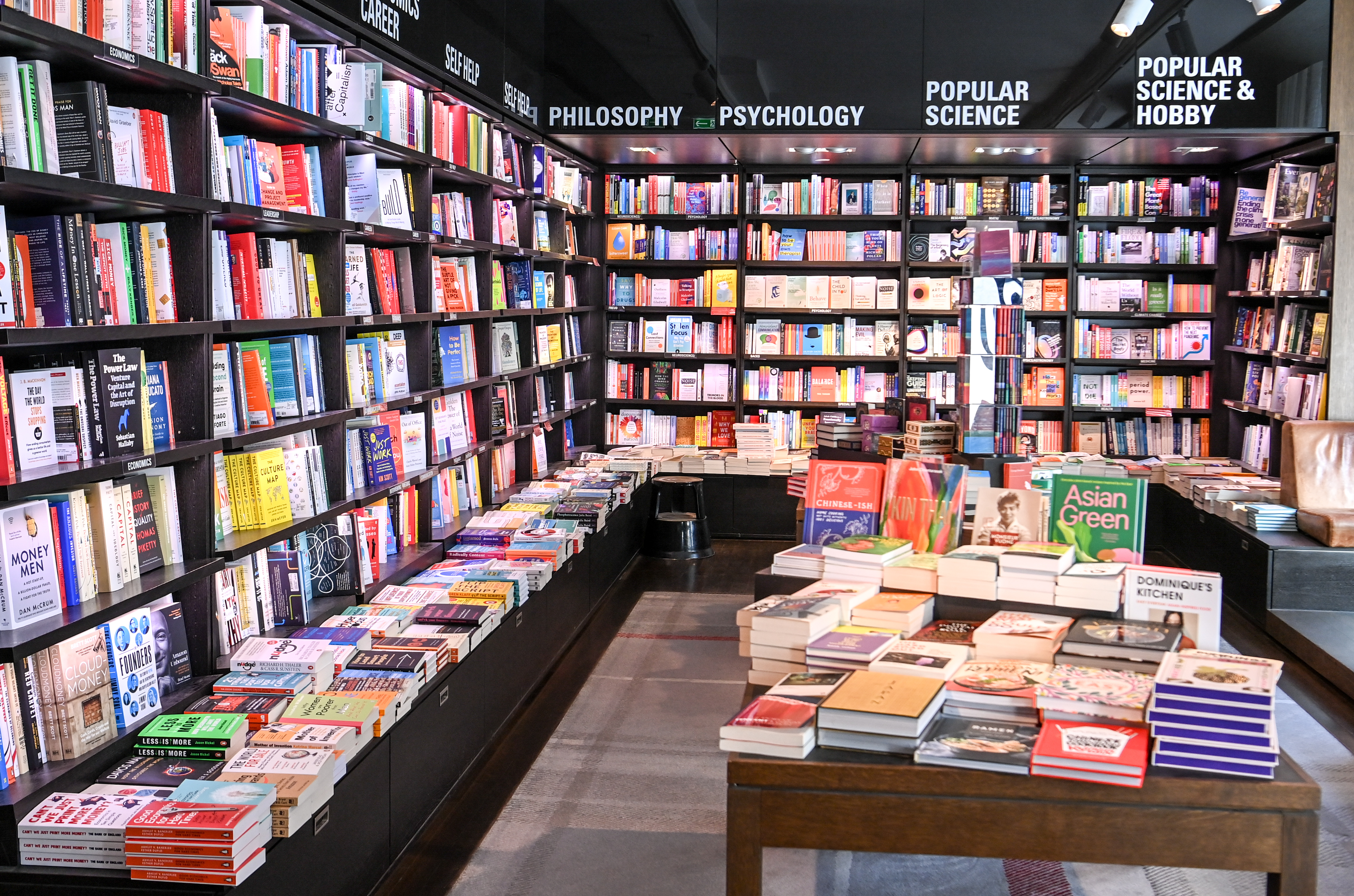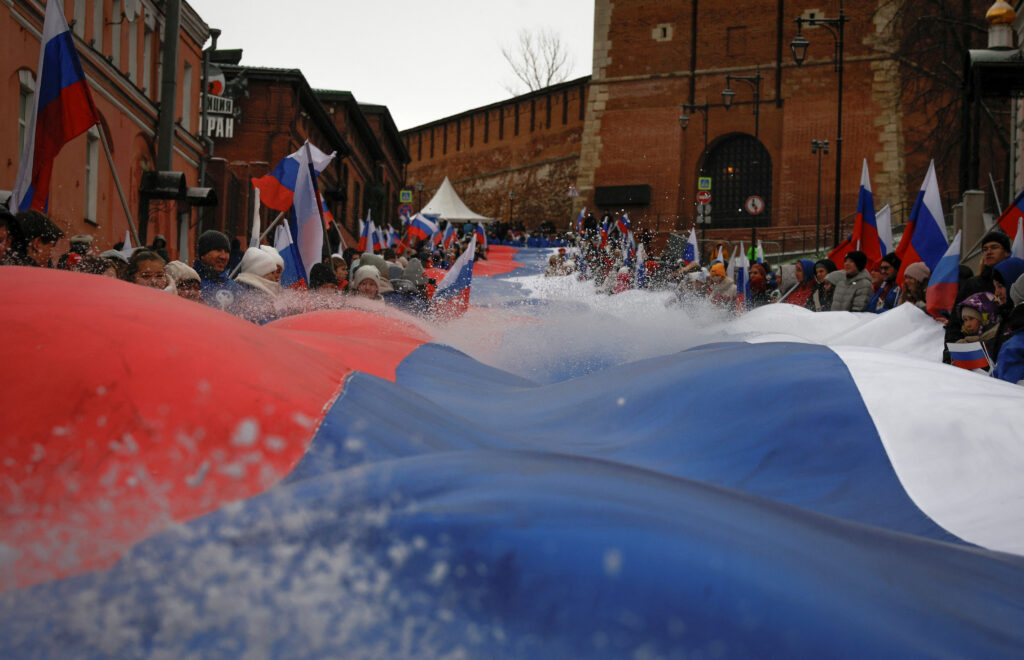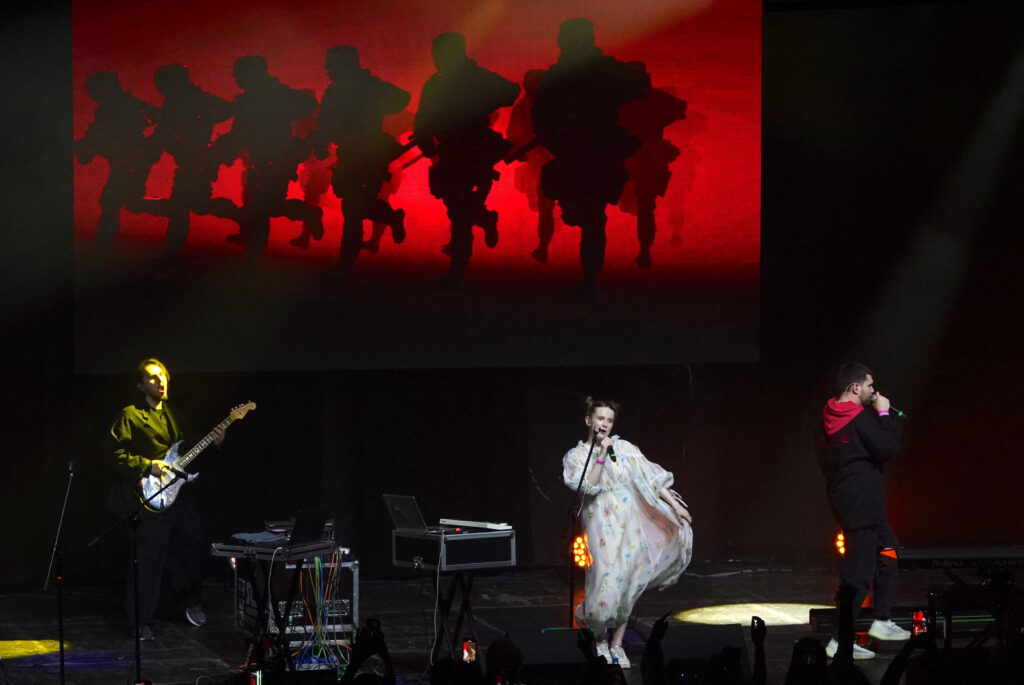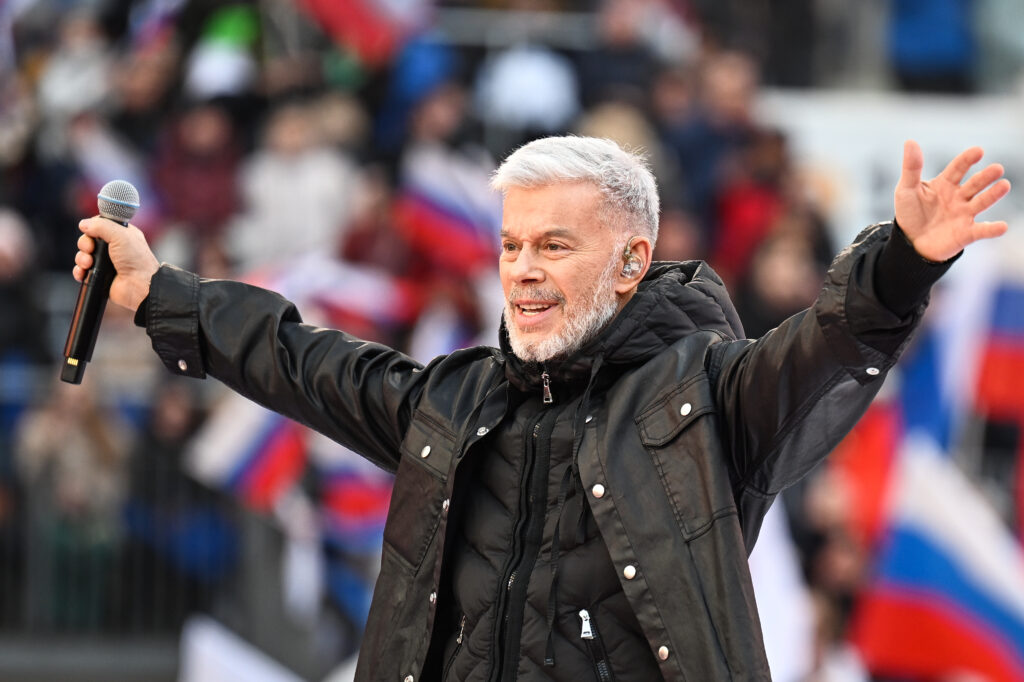‘Russian literature did not start the war; it was politics that unleashed the war. So, one is free to love Russian literature. Any literature apart from trash. Everybody is free to speak. Apart from Putin’, says Jörg Sundermeier, founder of the independent German publishing house Verbrecher Verlag. If you don’t have time to dive into the subject, this utterance is a synopsis of the attitude of German publishers to Russian literature after 24 February. If you want to hear more, let’s get to the bottom of it.
A new crisis
The German book and publishing industry is eight to ten times bigger than its Russian counterpart, with an annual turnover of around EUR 9 billion. However, the real picture behind these impressive figures is less rosy. The world’s third-largest book market is at a low ebb, with sales falling by 2.1% in 2022. German publishers and booksellers believe that they survived the pandemic suffering the least-possible losses thanks to state aid, but reports are already calling the difficulties associated with Russia’s invasion of Ukraine a ‘crisis‘.
Supply chain disruptions and soaring gas and electricity prices have generated a noticeable increase in the cost of book production. The number of books published in Germany has been steadily decreasing; five years ago the German market could boast of 80,000 new titles a year, whereas now this figure is only slightly above 70,000. Publishers are becoming more careful in every sense, and the desire to publish Russian-language literature amidst a full-scale war in Europe has been dampened. Given the situation, major German publishing houses prefer to give more space to Ukrainian and Belarusian authors. Yevgenia Belorusets, Yurii Andrukhovych, Serhiy Zhadan, Alexander Filipenko and Tetiana Maliarchuk are frequent speakers at events, their old books are being reprinted, and their new works are being displayed on the shelves of big bookstores and winning prizes and awards from the German literary community.
Cancelled ‘cancellation’
In May 2022, Vladimir Sorokin said at an event held at the House of Literature (Literaturhaus Berlin), when the German translation of two of his books was launched, ‘I think we, Russian writers, are in for the unexpected. And all those who write in Russian have to be prepared for that.’ However, neither Sorokin nor anyone else has been affected by cancel culture as such. Instead of unconditionally severing all relations with their Russian counterparts, German publishers introduced a policy of ‘screening’, which implies client background checks. The process of client verification is complicated by the fact that most publishing houses in Germany lack Russian-speaking staff who can understand the intricacies of an unfamiliar book and publishing market.
It is noteworthy that this cooperation is important primarily for publishers in Russia, who otherwise risk being cut off from the EU literary world. The difference between Russia’s dependence on ‘cultural imports’ compared with that of Germany is self-explanatory. In Russia, the proportion of translated books constitutes up to 70%-80% of the most popular publications (according to the Russian Book Chamber’s data on the top 50 best-selling books), while in Germany it has been around 13% for years. Even when it comes to the best-selling books on hot topics, the Germans replace them, with varying degrees of success, with homegrown products. In terms of the popularity of the source languages of literary works translated into Russian, German ranked second in 2021 according to Russian official reports. Notably, 1,315 books were translated from German into Russian (to compare, nine times as many books were translated from English into Russian the same year).
It is no coincidence that, when asked to name contemporary Russian writers, lettered Berliners often name emigrants such as Vladimir Kaminer or Olga Grjasnowa who have spent their adult life in Germany, who write in German and who address the subject of the Soviet past, which is understandable to East Germans and attractive and exotic to West Germans. It is as if, when asked about famous German poets, Russians would name Olga Bergholz.
Maria Schlisser, a literary agent who mediates the path for many Russian authors to bookstores in Germany, believes that books from Russia were not immensely trendy in Germany before the full-scale war unleashed against Ukraine and that there was no dramatic rupture after 24 February. According to her, publishing houses for children’s literature responded to the outbreak of the full-scale war in the most decisive way. Still, the vast majority of German publishers did not revoke licences or terminate contracts.
German publishers have their own answer to the notorious question about the last eight years. Among contemporary Russian writers, it was mostly people with a reputation for dissidence who were being published regularly by the second half of the 2010s: Vladimir Sorokin, Lyudmila Ulitskaya and Viktor Yerofeyev, among others. Before that, books by right-wing militarists from Russia such as Zakhar Prilepin were occasionally released in Germany. In 2012, his Sankya, a book with an 18+ age limit about a young political activist (paradoxically, the novel has recently been included in the recommended reading list for schools in Russia), was published by Matthes & Seitz, a vanguard of intellectual literature published in German. But even at the time, according to its editor-in-chief and owner, Andreas Rötzer, this was a flippant gesture. Since then, Matthes & Seitz has published books by Oxana Timofeeva, Alexander Ilichevsky and Olga Slavnikova but not the authors found on the pages of the Zavtra newspaper.
Dissident status facilitates the decision-making process on the part of German publishers, as does the work of the Russian authorities, who label dissenters as foreign agents. In this way, the Russian state does the work of foreign scouts, by indicating who can be trusted. At the same time, the notorious cancel culture demonised by state media turns out to be just another propaganda myth broadcast on Channel One and social media. For effect, TV presenters compare the ‘annihilation of Russian culture in Germany’ to the policies of the Nazi period. However, there are no calls from German publishers to abandon the publication of Russian classics. On the contrary, one of the most common arguments used in the current controversy is ‘Puschkin ist kein Putin’ (Pushkin is not Putin). As for loyalist prose or poetry reflecting anti-Ukrainian sentiments, the logic of the language suggests that one can cancel what is already present in the culture, while translations of so-called Z-poets, who glorify Russian arms, are absent from the German-speaking space, and there are no plans to include them.
Some far-right publishers are still offering Aleksandr Dugin’s books, but the main players in this field are not registered in Germany, as German legislation is strict on the rehabilitation of Nazism and on incitement to hatred. Contrary to the narrative of Russian TV propaganda, German publishing houses are still among the most receptive to the Russian language and literature. Translations from Russian were published throughout 2022, ranging from names German readers were already familiar with (Maria Stepanova, Dmitry Glukhovsky and Vladimir Sorokin) to those new to the book market (such as Alexey Salnikov, for example, who shuns direct political statements, and whose book was published by Suhrkamp, a trendsetter when it comes to reading tastes).
Business as usual?
In 2022, for the first time in its history, there was no Russian stand at the Frankfurt Book Fair (Frankfurter Buchmesse), Germany’s largest trade fair for books. Still, during business meetings and on the sidelines of the event one could come across representatives of the Russian literary scene who had already left their home country: Mikhail Shishkin and Dmitry Glukhovsky. Spain was the guest of honour of the Frankfurter Buchmesse 2022. It was provided with a special pavilion, and it could implement its own programme of literary events. However, once one entered the exhibition pavilions of the Frankfurter Buchmesse, it became clear that Ukrainian authors and publishers were the main focus of the event, and the theme of supporting Ukraine in the war was a leitmotif of contributions by authors from different countries.
‘Yet we know that books do not always promote what is good. (…) There are bad and mendacious books; there are writings that tempt us to evil, to animosity, to inhumanity. No war, and we are witnessing this once again, is without pamphlets, without self-justifying speeches, without diatribes or, unfortunately, without books and articles full of hate. (…) [T]he devastating impact that the war is having on the entire book and publishing industry in Ukraine must not only outrage us but also motivate us all to do what we can to help and provide assistance.’ These were the opening words delivered by Germany’s current President at the Frankfurt Book Fair. Publishers and literary agents themselves, however, shied away from high-profile statements, leaving them to writers and activists. While commenting on the current state of affairs regarding the sale of rights to Russian publishers, a representative of one of the leading international literary agencies said, with a morbid sense of humour typical of the English, that ‘as long as nuclear weapons have not been used, publishers from Russia can count on acquiring rights [from those who did not leave the market during the first six months of 2022]’.
German publishers have not stopped selling rights to their authors’ works to Russia (these authors are not only citizens of the DACH region; worldwide recognition of German publishing houses enables their Russian counterparts to acquire global rights to the heritage and works of internationally recognised writers). German publishers have not severed these ties, partly bearing in mind the print runs of hundreds of thousands of copies of works by Heinrich Böll circulating in the Soviet era without any copyright. German publishers are also mindful of frequent statements by Russian politicians who see the need to introduce ‘parallel imports in the intellectual sphere’, that is, to legalise copyright infringement. Moreover, many people perceive publishing as a humanitarian activity which does not belong to the sphere of conventional business. The perception of ‘book time’ as something special that does not coincide with the daily cycle of grim summary reports from the battlefield or news of the civilian death toll is generally characteristic of the book and publishing industry. For example, Petra Hardt, a veteran in the book publishing industry who spent 25 years running the copyright department at the Suhrkamp publishing house, dispelled fears of the possible ‘cancellation’ of Russian culture expressed by her Russian peers during a Zoom meeting for the Frankfurt Book Publishing School: ‘Publishing houses publish Russian authors, theatres continue to stage Chekhov, Maria Stepanova was recently awarded a prize. A book is a universal thing, so nothing can affect it so instantaneously.’
British and American peers took more decisive steps. In March-April, the world’s largest publishing houses, including Penguin Random House, Pan Macmillan, Simon & Schuster, Curtis Brown and Hachette UK, discontinued cooperation with Russia. Ebury, Michael O’Mara and some academic publishing houses such as Oxford University Press also announced they were going to sever ties with Russia. Together they account for a significant proportion of all translations into Russian; Simon & Schuster alone publishes over 15,000 new titles each year and controls 16% of the world’s book sales revenues. Many UK and US publishers have also blacklisted their peers from Belarus. Some big-name authors took a firm stance and revoked licences for their books in Russia. These writers include the super-bestselling authors Stephen King and Neil Gaiman, among others. In order to make up for the decreasing inflow of chick lit, the Russian book publishing giants have turned their eyes to the novelisation of Turkish TV series which are fairly popular in Russia. And to make up for the loss of contracts with British and American publishers, Russian publishing houses began actively seeking contacts with their peers in Germany, France, China and Turkey.
A new literary reality
German publishers continue to publish Russian-language books but are even more determined to express their solidarity with Ukraine through assistance programmes for writers, translators and authors, as well as by collecting humanitarian aid for the civilian population. Katharina Raabe, an editor for Eastern European literature at Suhrkamp Verlag who was awarded the prestigious Deutscher Sprachpreis (German Language Prize) for making Eastern European literary voices heard in Germany, is not convinced that the war in Ukraine will bear fruit in the form of big novels. Raabe refers to the post-war experience in the countries of the former Yugoslavia and points out that such events are rather reflected in poetry and autofiction as the most flexible and responsive mediums.
German publishers are probably expecting some glaring statements, anti-war gestures and flagship publications about Putinism from Russian-speaking authors. However, such publications have not been numerous in Russia in the past 11 months. Those who publish in Russia have to deal with a multilayered system of censorship that forces authors, their editors and their publishing houses’ lawyers to remove anything that could violate Russian law. Over the past year, the list of punishable offences has expanded to include bans on comparing the USSR to the Third Reich, so-called LGBT propaganda, discrediting the Russian armed forces and the like, making the writing of a major war novel akin to walking through a minefield.
As Evgenia Nekrasova has put it, ‘Book censorship has started to get worse recently. I have seen it develop step by step and gradually affect everyone. Journalists lost the right to write openly about different things much earlier, but literature for a long time enjoyed much more freedom than the press. That’s no longer the case, and we’re witnessing the growing encroachment of the state upon literature. This is the first time that I’m facing it as a writer, so I do not yet have a clear answer as to what to do in such a situation.’ At times like this, the role of activists involved in book-writing is growing, because they have already severed ties with Russia and clearly have no intention of going back home in the coming years. In addition, their literary work strikes a chord with what is going on. Still, it should be noted that most German publishers are mainly oriented towards a text’s artistic qualities and are concerned that, from the point of view of their long-term publishing plans, immediate literary responses to the events of the day maybe short-lived.
The mass emigration of the intelligentsia from Russia will inevitably transform Russian literary reality. As Katharina Raabe reminds us, over the last thirty years Russian literature has already begun to migrate beyond Russia and even the Russian language. Gryaznova, Gorelik, Salzmann, Martynova and Yuryev, who left Russia in the 1990s, wrote some of their works originally in foreign languages (like Nabokov). This trend continues, as Russian-speaking authors are scattered around the world, from Paris to New York. In other words, we are witnessing a dislocation of Russian writers and literature that does not, in fact, originate in Russia. However, this reveals the lack of preparation on the part of the book and publishing market to undergo restructuring. According to the classical model, texts enter foreign markets after a success in their home country. In the absence of this mechanism, one has to be very confident that the author’s name itself will suffice to sell the book. Currently, the list of authors who can circumvent this difficult rule of making their first successful publication in their native language with the help of foreign connections is growing. Recently, Marina Ovsyannikova, a former TV journalist, published her book in German, and books by opposition leaders Mikhail Khodorkovsky and Garry Kasparov are due to come out in 2023.
There is no single mecca for relocated writers, either geographically or institutionally; there is nothing like the Posev publishing house or the journal Grani, which published authors banned in the USSR in post-war Germany as part of the Tamizdat initiative. Of the publishing houses which do exist abroad and keep their finger on the pulse of contemporary Russian-language literature, the ROAR anti-war almanac edited by Linor Goralik, and the small press operated by the Babel bookstore in Israel are the only ones worth mentioning. Still, they are inferior in scale compared with their predecessors from the second wave of emigration.
The sluggishness of the book and publishing industry
Those who are divided by borders have to come up with workarounds in order to earn an income or to pay royalties. For example, Andreas Rötzer, from Matthes & Seitz Berlin, and Wolfgang Wiedling, a literary agent, suggest that their authors keep their royalties in German banks and withdraw them as soon as it is convenient to do so. The shutdown of the Swift payment system has also affected the flow of remittances from Russia. Sanctions have ruined what was already only meagre support for the translation of literary works from Russian; earlier, translators working from Russian into German could receive decent fees while publishers could save on translation costs. In spring 2022, the Institute for Literary Translation discontinued its grants while the Mikhail Prokhorov Foundation, which had previously supported many translations of non-fiction, removed its English-language page from the .com domain. Given that the cost of waging the war, over 11 months, has exceeded the annual budget for culture by 50 times, it is not surprising that Russia is winding down international cultural projects. These grants and assistance programmes greatly contributed to promoting Russian-language literature, since these are small publishing houses with an independent policy and a loyal audience of intellectuals that are primarily interested in them. There are more than 3,000 registered operating publishers in Germany alone. On top of that, there exists the well-established tradition of small presses and self-publishing presses that publish books, magazines and brochures in print runs of two hundred copies each. This helps to sustain the modest and not very systematic interest in Russian literature in Germany, which can still enjoy access to a fairly wide range of authors, both living and dead. When looking at books from indie publishers, one can come across such unexpected rarities as Mikhail Prishvin’s Diaries and Boris Poplavsky’s Apollon Bezobrazov (Guggolz Verlag), Dmitry Prigov’s Moscow and Muscovites (Ciconia ciconia), and works by the radical modernists Arkady Bartov and Alexander Galper (Propeller Verlag). For a number of niche publishers, having to pay EUR 10,000−15,000 for a project which is obviously not very profitable is a serious impediment.
German publishing houses closely associated with Russia have suffered more than others and have been forced to close their offices in Russia. For example, the Berlin-based architectural publishing house DOM Publishers, which had a small office in Moscow until spring, found it impossible to import books into Russia and struggled with problems over money transfers. DOM Publishers has temporarily ceased operations in Russia and the publication of new guides related to the country. Philipp Meuser, the head of DOM Publishers, recalls: ‘I was very enthusiastic after having worked with the Russians for several years, with people from the former Soviet Union, and I thought that sooner or later Russia would become a full-fledged member of Europe. But the policy we’ve observed since 2000 points in a different direction (…) It’s Russian policy that has to change.’
To sum up, I would like to return to the thesis about the slow pace of book and publishing time: German publishers take pride in their long-term planning (most of the publishers we surveyed had a release schedule ready before the war for the period until 2025, on average, and it is extremely difficult to deviate from the well-trodden path). German publishing houses despise ephemeral trends. Therefore, any changes stemming from a new attitude towards Russian literature, the need to decolonise its perception or change who gets to represent it in their country will take place slowly. Noticeable changes will become apparent only starting this year.










